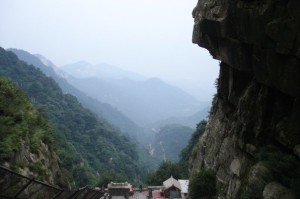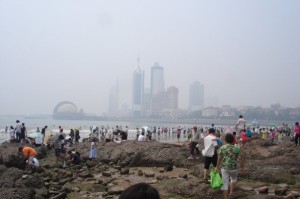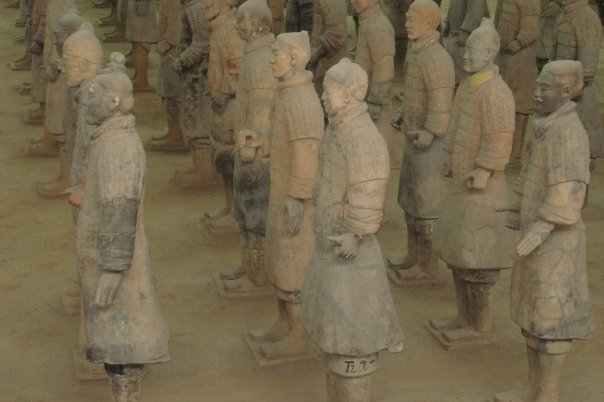My inspiration for going to China came from a classmate at Harvard. She taught English in southern China for the month of July and invited me to explore the north with her ‘because it would be easier to travel with a Westerner’ (she was born in Manchuria and moved to California when she was ten). I assumed this meant she – a petite, pretty Asian would feel unsafe traveling alone. But I was a bit confused: I may be tall, but was I really the best choice for a bodyguard?
As it turns out, my martial arts skills were never called for. In fact, I felt more comfortable walking down the street in China than I do in continental Europe, where any woman with two legs, no feathers, and possessed of a soul* can count on unwanted attention. Foreigners, especially, are treated with immense respect. Whenever I was on a crowded train or bus, people would insist I take their seat. If an official saw me waiting in line at a train station, I would be immediately taken to the counter. This special attention was the reason Jenny wanted to travel with me: as a Chinese girl, she would have to wait in lines and fight for space like the rest of her countrymen. By toting along a tall white girl, all that nonsense could be avoided.
(I should mention: this indulgence to foreigners, predictably, does not extend to the marketplace. Strangers with their favorable exchange rates are the natural prey of knockoff-Burberry-clad merchants. I only narrowly managed to escape buying a ‘Rolex’ worthy of a French President.)
We joined the obligatory herd of tourists at the terracotta army outside of Xian before catching a fifteen-hour train ride toTai’an, a town in Shandong province south of Beijing. The train was basic: six boards intended to function as beds to a compartment, a hole at the end of the car for a toilet, and a fan which probably last functioned under Mao for ventilation. Sharing our compartment were a middle-aged man who snored, a Blackberry-toting businessman, and two shirtless boys who stared at me for hours at a time. And I thought the businessman in Common Class would have been a more unusual sight.
Two days in Taishan were spent climbing on foot and descending by cable car Tai Shan, the ‘first of the five sacred mountains in China’. Taking to heart the posted warning ˜Obey the rules and have a good trip’, we mostly stuck to the path, which has been a pilgrim route since before Confucius’s time (571-489 BC) and is dotted with ancient temples and dramatic carvings on seemingly inaccessible cliffs. The last .2 kilometers our 10.7km climb up the ‘Stairway to Heaven’ had 1600 stairs, a fact I would have been happier to learn in retrospect. Suffice to say it was a good workout.
 |
| The view from most of the way up the Stairway to Heaven |
We moved on to Qingdao, an old German colony with one of the most unappealing beaches I have ever seen: brown, rocky and weed-strewn, tidepools that smell more like cesspools, and a horizon dominated by ill-conceived modern architecture. We stayed for two days, and I headed back to Beijing on my own. On my way out of the city, I marveled at its size: it seems like there are enough skyscrapers to house all the jobs in the world. And yet there are cranes everywhere – dormant while the city struts its stuff for the Olympics, but ready to roar back into action. Celtic tigers and lionsnotwithstanding, it is hard to imagine a future not dominated by the Chinese dragon.
 |
| The beach at Qingdao |
* Reading: Candide


